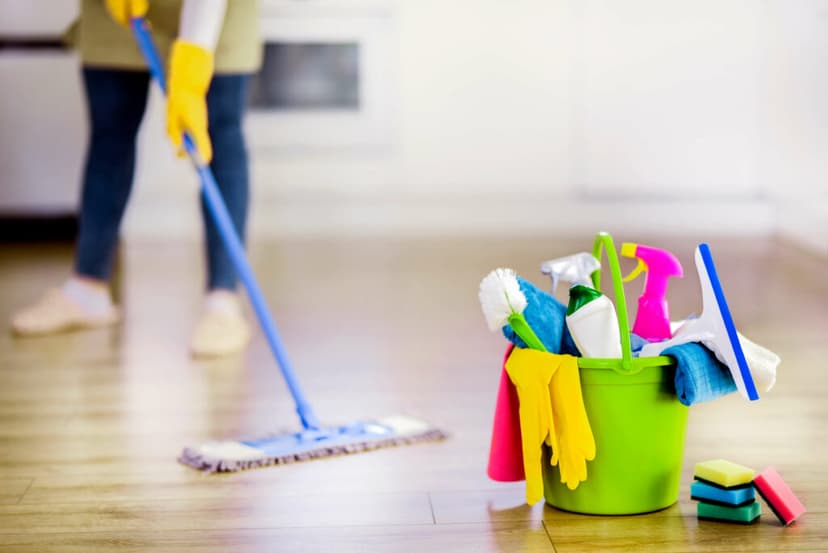How Much Does It Cost to Start a Cleaning Business?
Residential Cleaning

Cleaning is an essential task. Whether it is cleaning homes, vacation rental properties, office spaces, schools, hospitals, and more — cleaning will always be necessary. This means that professional cleaning services will always be in demand.
If you want to take advantage of this demand and start your own small business in the cleaning industry, it can seem overwhelming since there are so many factors to consider. Equipment costs, hiring employees, insurance, licensing, permits, and more must be well-thought-out before diving in.
So, where do you begin?
Below, we walk you through everything you need to know to begin figuring out the start-up costs for your own cleaning business.
It is important to first differentiate which type (or types) of cleaning your business will provide. Will it focus more on residential or commercial business? For most cleaning businesses, it’s either one or the other.
To put it simply, residential cleaning focuses more on single-family homes and personal areas, whereas commercial cleaning specializes in business or office spaces.
It is also important to consider that residential cleaning is typically done during the daytime and commercial cleaning is done after business hours, usually at night. There is also the option to have a niche focus, such as floor waxing or cleaning and sanitizing hospitals.
Choosing which to specialize in will greatly affect cleaning business start-up costs because of the difference in equipment and competition. Consider making a list of the pros and cons for each category to help you decide.
Another option to consider is purchasing a cleaning franchise. Cleaning franchises are low-cost and popular for beginners, with over 15 brands to choose from. Costs for cleaning franchises can range from around $3,000 to over $225,000.
Before starting your cleaning business, research the price differences between franchising and starting a business from scratch.
Choosing the right tools for your cleaning business is key. The cost of cleaning supplies and equipment will vary depending on the specialization but typically requires at least $400, depending on the quality and quantity of the items. This cost would include everything from the vacuums, mops, sponges, cleaning products, and more.

Registering your cleaning company with a license is not required, but it varies from state to state. Make sure to check online to confirm if you need a license on your state’s business regulation website.
Most cities require a general business license. This cleaning business license cost is around $75. You will also have the option to register your business, with the cost being dependent on which type of business you choose.
The most inexpensive option is registering as a Sole Proprietorship, which can be as low as $30. Another option is a Limited Liability Company (LLC), which can range from $100 to $500. Both options have their benefits, so do research on which suits your cleaning company the best.
The average cost of cleaning business insurance can range from $500 to $1000 per year. Of course, each company and policy is different and not always within this range.
Generally, there are three different types of insurance that are recommended for cleaning businesses:
This insurance covers legal fees, medical expenses for employees, slander, libel, and any property damage by a cleaner.
This covers bills associated with medical treatments, such as work-related injuries. It also covers the wage of the person being treated while outside of work.
Tools and equipment insurance covers your cleaning tools if they get stolen or damaged in certain situations.
Getting the word out and attracting new clients is essential to growing your business. Opting for social media and in-person networking is a cost-effective way to spread the word. Prices for other means of advertising, such as print and digital advertising, vary tremendously.

Consider printing out business cards (around $50) to pass out to potential clients and showcase your professionalism. There are also free marketing strategies online to apply while advertising for your own business.
To fully grasp your cleaning business start-up costs, you must determine your rates for cleaning. Different factors such as competition, clients, and location will help determine how much to charge for your service.
For residential cleaning services, choose from either hourly rates or flat rates:
This is the most common method of charging rates. Depending on your location, size of the residential property, and competition, cleaners may charge from $25 to $100 per hour. Remember to look up the rates of other cleaners in the area to see what they’re charging to keep your rate competitive.
Charging a flat rate is very popular. Your price will be dependent on a lot of different factors, including location, size of the property, specific tasks, and more. Some customers prefer being charged a flat rate so they can plan ahead and know the rate each time.
For commercial cleaning services, it is common to charge per square foot. Many commercial cleaning services charge between $.05 to $.20 per square foot depending on the type of commercial space and the specific cleaning services being provided.
Finally, the last step is to add together every expense in order to find your cleaning business start-up costs.
If you haven’t started performing cleaning services yet, you won’t be able to deduct any of your earnings from this calculation. That said, if you’re leasing equipment or purchased something through a payment plan, you could apply future profit to those recurring expenses.
How much are you planning on investing in your cleaning business? Carefully looking at your financials is vital to the success of your company. Since there are many factors to input and add together, make sure you write every expense down.
The bottom line is that the initial investment required for starting a new cleaning business may seem overwhelming at first. But once you take the time to create a realistic budget and business plan, you’ll be on your way to becoming a successful business owner.
Once your cleaning service is up and running, check out Taskbird to help you work efficiently and grow your business.